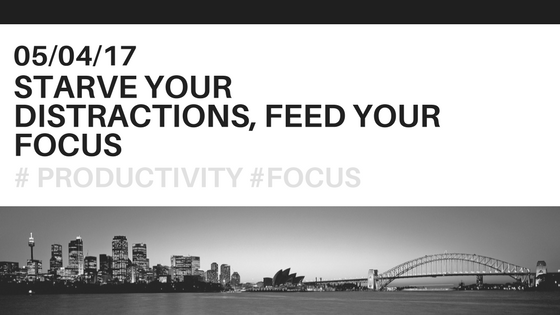Welcome to the 21st century. Distractions are literally everywhere you look. How can we not get caught up in distractions when everything we own seems to buzz, beep, or flash at you? This habit may be the hardest to pick up, but I guarantee it will be the most lifechanging.
Distractions come in the form of emails, texts, phone calls, co-workers, and other variables in your environment. In a study produced by Michigan State University, 300 participants were given a task to complete consisting of a sequence-based on a computer. This chore mimics the usual work tasks of a majority of office workers. They then produced distractions with various intervals. They found out that it only took a distraction of less than 3-seconds to result in twice the errors to their original effort. Less than 3-seconds! That’s similar to just glancing at your phone to read a text message. So why would this very short distraction cause so many errors? According to the lead researcher, Erik Altmann, “the answer is that the participants had to shift their attention from one task to another. Even momentary interruptions can seem jarring when they occur during a process that takes considerable thought.”
As I’m sitting here typing the book, my phone’s notifications are constantly drawing me away from concentration. So how do we take back our attention from the technology that now surrounds us? One strategy to remove distractions from our electronic devices is to simply turn off the notifications. This sounds maybe too intuitive, but without that little pop-up to check an email or the ding of your phone saying that you have a message, I can guarantee that you would not check your messages nearly as regularly. That “little” notification is intoxicating. It sends a rush of dopamine to your brain. Like that of drugs or sex. The unpredictability of the message triggers your brain to produce dopamine. You can actually become addicted to these alerts. Scary, right? I suggest picking two to three times a day to check emails and respond to calls or messages. You may miss a few “important” emails now and then, but your productivity will increase exponentially with just this small shift.
As a student at the University, we had various study groups that would meet to trudge through thermo’ homework or study for the next big test. These groups were great when you didn’t understand a topic because you could often get someone else’s take on a subject. They were not so great when you failed to grasp the concepts, because of the distraction caused from your peers. This takes place in corporate offices throughout the business world. Many distractions are in the form of questions or requests from co-workers, managers, or clients. How do you eliminate these distractions without abolishing the company’s culture norms and maintaining relationships? The key is communicating your needs up front. Tell your roaming colleague (oftentimes looking for a distraction their selves), that the best way to ask a question of you is to email you and you will get back to them. You may lose a few friends at first, but you are becoming more productive and taking your time back. You shouldn’t feel bad for this. They will eventually respect your requests and will start to make it a habit of sending an email first. You will then answer emails when you originally prearranged to. This will significantly cut back on distractions in the workplace.
With all of the distractions taking place these days, it’s a wonder anything gets done. You now have the advice and tools to reclaim your day from the power of disruptions. All of these distraction elimination techniques require discipline. Discipline to turn off notifications, discipline to confront diverting co-workers, and the discipline to block certain websites.

